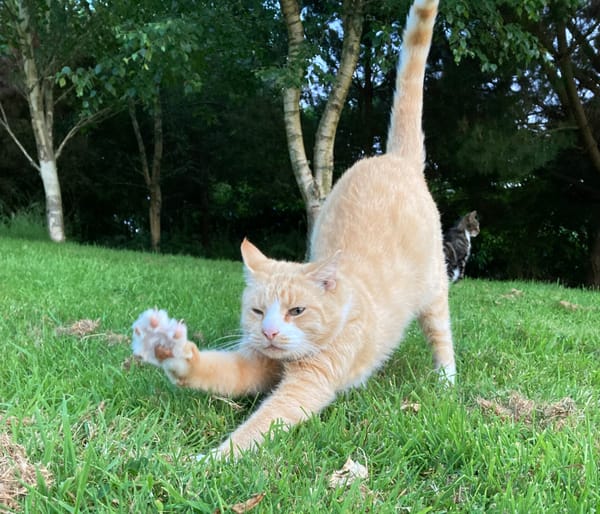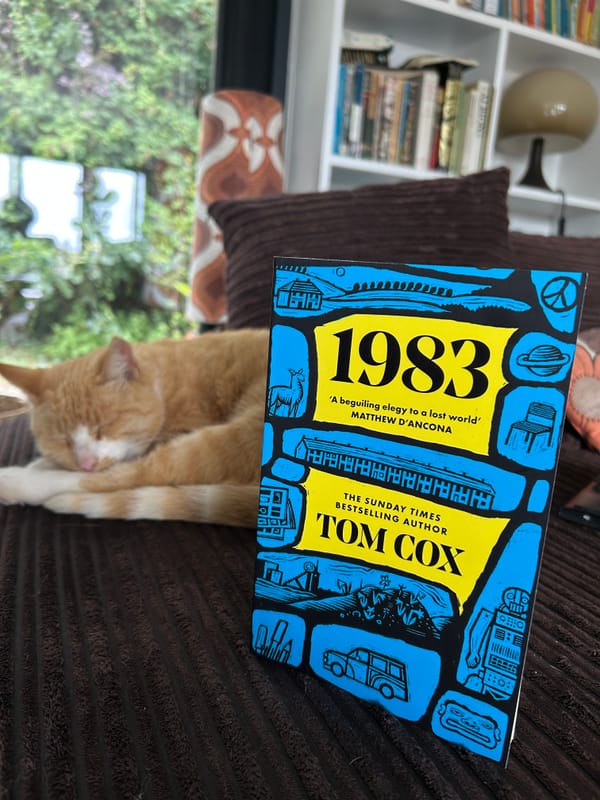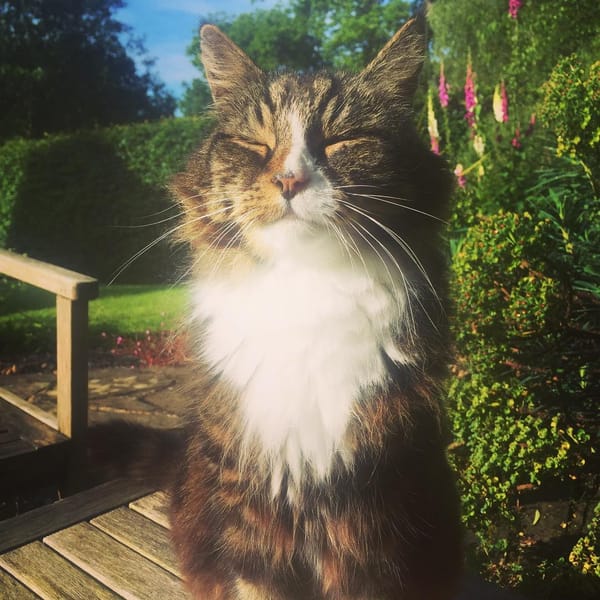The Post-Book Crash Is Real And Don't Let Anybody Tell You Otherwise
Plus An Exclusive Excerpt From Next Year's Novel
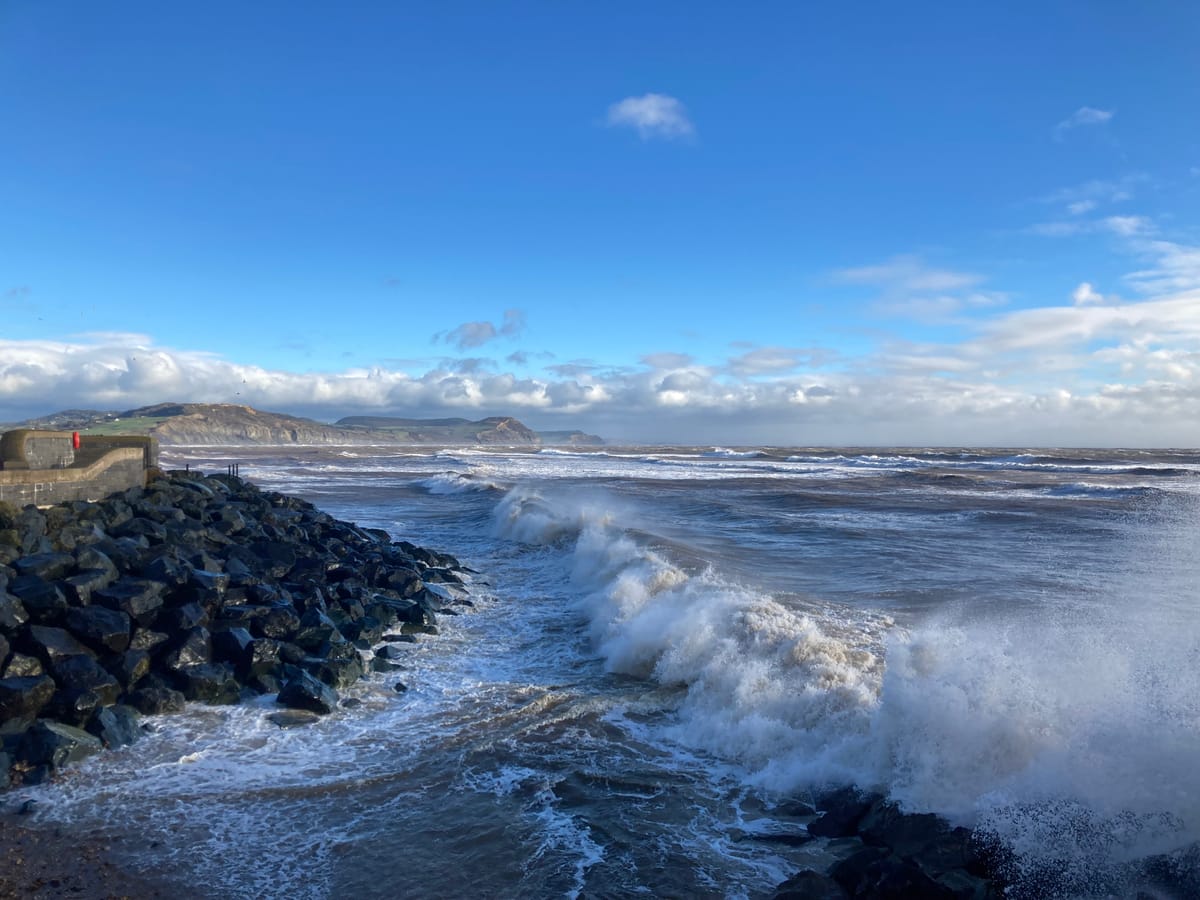
If you’d like to support my writing by becoming a full annual paid subscriber to this site I will send you signed and personalised hardbacks of my books Villager and Notebook wherever you happen to be in the world.

I have now published 14 books and if I’m completely honest with myself there’s probably not been a single one of those that hasn’t been accompanied by a sizeable emotional crash somewhere along the line, typically in the weeks directly after publication. Sometimes the crash is based more rationally on factual evidence, sometimes less so. Do other authors manage to avoid it? Perhaps some do. But I know the pattern is not unique to me, and I have learned that it’s pretty much inevitable and there’s not much to do except ride it out until you begin to feel robust enough to regroup.
Something else I have noticed about the emotional crash: the more of yourself you put into a book, the bigger it gets.
Is that a reason to put less in, to work less hard, to protectively hold some elements of your heart and soul back? I don’t think so. And here is why:
I got out of bed yesterday morning and, after roughly three minutes of being sentient, it became apparent that what I was about to experience was Crash Day for book fourteen. I had reached a point on the far unreasonable side of exhaustion from weeks of long drives to events (and no less from the seemingly endless admin and promotion surrounding those events) and worrying about technicalities related to my novel’s birth, and suddenly all I could see was what the novel hadn’t done in the 16 days it had been out in the world: the friends I’d sent it to many weeks ago and heard nothing from, a couple of pretentiously pissy reader reviews, its lack of prominence in most bookshops, its lowly position on Amazon’s sales rankings, my deletion of my social media and the potential damage I’d done to the book’s health with that, combined with the mental image of all those other authors I always used to see on Instagram living it up in shops that were window-displaying seventeen billion copies of their multi award-winning novels. In the sleep-deprived state of mind that I was in, I managed to blot out every bit of early enthusiastic feedback I’d got about 1983 and the astute things few bright reviewers had already said about it. I didn’t think about the many supportive and passionate booksellers I’d met; I thought about the lone condescending one I’d met on a singularly bad day during publication week. I didn’t think about the final time I’d proofread the book through and known, in my bones, that my obsessive hard work on it had made it everything I had wanted it to be. I did think about that obsessive hard work, however, and about every sign I’d seen that it was being ignored or misunderstood or despised, and what I wondered was, “My god, is it fucking worth it?”
I slept better last night and today I see everything from another angle. I made my decision about the way I was going to tell stories and publish them a long time ago. I’m committed to it, and I know how it works: the parts that frustrate the fuck out of you, again and again, and the rewarding parts that make up for those other parts. I am fully aware of what it’s like to write worse books that have a greater chance of shifting units because, until around 12 years ago, when I started to become less diffident and well-behaved, I used to do exactly that. I could still do it, but I stubbornly choose not to. I refuse to prioritise surface of things, despite being repeatedly told that prioritising the surface of things is the way to function and survive in the arts in 2024. My books are not designed for immediate explosive success; they tend to find their readers gradually and quietly, by word of mouth. It’s the way I write them, but it’s also inevitably what happens when you don’t have a big marketing budget behind you.
There is a curious relief in getting confirmation that 1983 is not considered an important or exciting book by the world beyond the one reading this Substack newsletter. With that relief comes acceptance, and with acceptance usually, for me, comes the prospect of distraction-free creative absorption, and distraction-free creative absorption is my happy place. In the end, 1983 is just another book by me, and has the hallmarks of a book by me, one of which is that it’s quite a bit different to my other books, and another of which is that it will receive no hype but result in a small number of people loving it and having quite an intense relationship with it. The people who it’s written for get it. I already have heard from them and trust they haven’t been lying when they’ve told me they felt bereft when the book ended. The people who it isn’t written for, meanwhile, will call it “weird” or belch out a shitty review of it online based on the 30 pages of it they read.
That’s the state of things. Publishing is a brutal industry, trying to find ways to survive in an era with a ruptured attention span. It becomes more brutal still when you’ve chosen to write stories that ask for, and seek to reward, a little more attention than most. When your work is connected to your financial survival, you get pulled further in and the setbacks and injustices press harder against the tender spots of your ego, even when you have intentionally moved away from as many ego-driven aspects of publishing as possible, and your general outlook is “Get lost, ego - I just want to sit somewhere under the coverage of heavy foliage and write!” You can be evil-hypnotised into thinking it is your job to correct those setbacks and injustices. In truth, all you can do is make sure that each book is something you gave everything to, and something you didn’t compromise on in a way that will make you annoyed with yourself later.
The rest is out of your control, probably not even your business.
And while it’s all going on, your only job is to write the next one, and try with all you can muster to make that one a bit better.
If you’d like to order 1983, you can do so via Blackwells, with free international delivery.
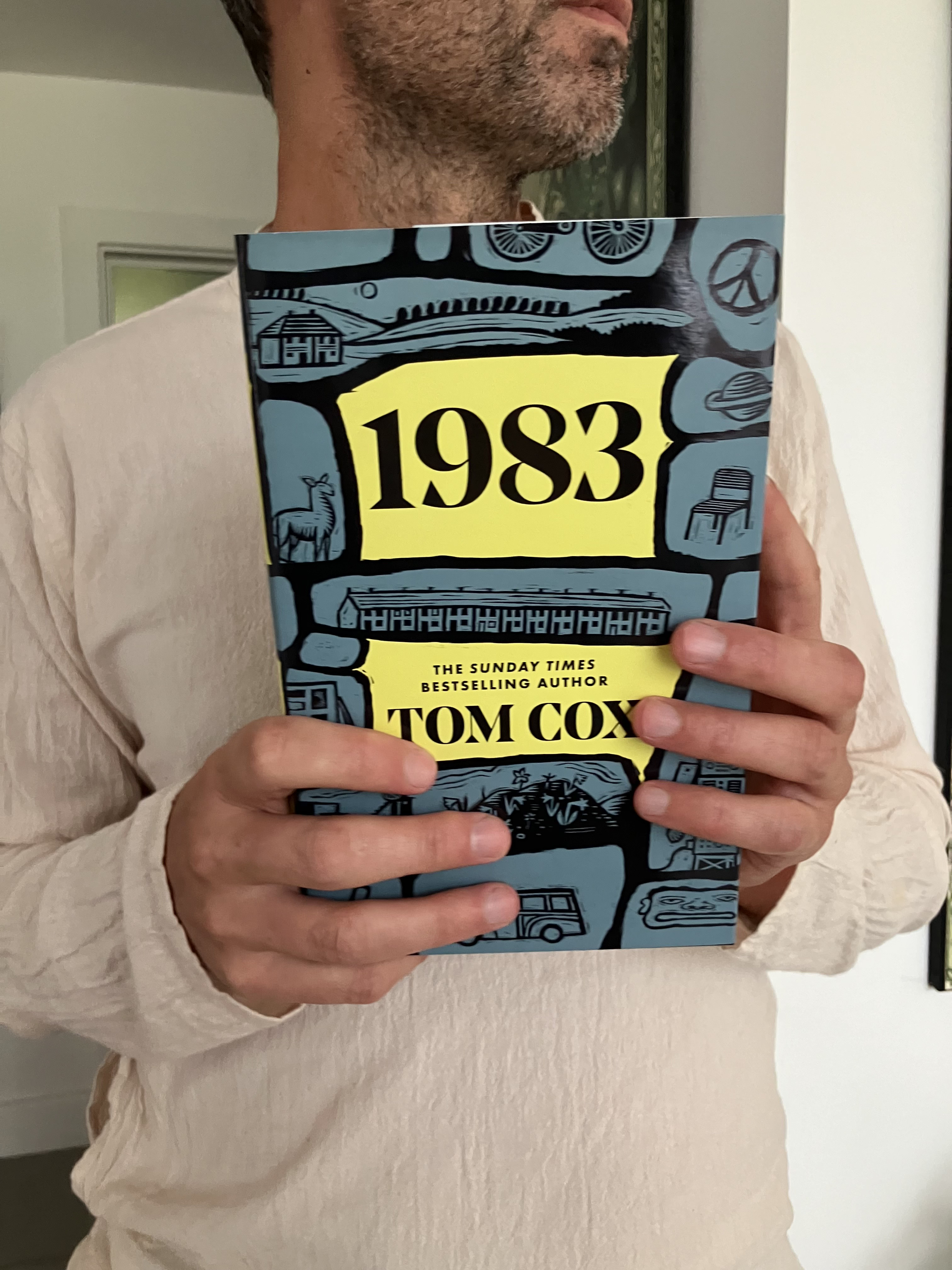
In the time between 1983’s completion and its publication, I wrote another, bigger novel (yes, I know: that probably didn’t help as far as the emotional crash was concerned, and I might pace things a bit differently in future). It’s called Everything Will Swallow You and I’m currently doing the final edits to it, ready for publication in March 2025. As a thank you to my paid subscribers, I’ve decided to post an excerpt from it below.
If you’d like to pre-order Everything Will Swallow You, you can do so directly through my publishers, and contribute to the book’s funding in the process.
EVERYONE WAS CALLED KEN BACK THEN…
What people never suspected when they heard Eric talking to and at them, jamming and folding and elbowing words into every available space, was that what they were hearing was a correction of a previous version of himself: a small quiet Eric who, although absent for half a century, never stopped being reachable to present day Eric, never ceased to exist as an adjunct to himself that he pulled along dutifully with him. When Eric spoke now, he was speaking for himself, but speaking no less so for 6 year-old Eric, and 7 year-old Eric, and Eric of every age up until 17, the Eric who wished he could say the sentences that other people said that encouraged other people to respect them and nod and laugh and sometimes maybe even later join them in a private conjugal place and consensually engage in a form of brief bewildering rapture. Words had not come easy to the Eric of half of the 1950s and all of the 1960s and a tiny bit of the 1970s that was still the 1960s in all but name. He felt them catch heavily in his chest or scramble up his throat and get wedged tight against one another. He looked at his friends - most of whom were, to be fair to Eric, older than him - and marvelled at their ability to respond to the universe with wit and insight, marvelled most of all at the speed with which they did it, the way they apparently never had to root and rummage for the wit or the insight.
He had been a twig of a lad, blowing up and down the streets of the northernish cities where he grew up, often in pursuit of his tall and heedless elder brother Mike. A scaler of fences, a thrower of stones, an explorer of bombsites, a ducker through holes in crumbling walls, a loser of shopping lists, an avoider of consequences. Out after dark. In before the shit hit the fan. F in maths, E in Geography, D in English, C in history, but the quickest runner in school. It was if his legs contained all the speed that legs could but additionally had borrowed the speed words should have had as they emerged from his mouth. He didn’t just run quickly; he walked quickly, too, a little camp dance to his step as he climbed to the top of Everton Park or, later, one of the seven hills that give Sheffield its pleasingly spreadeagled shape. His peers were not bashful in coming forward with reviews. “Nancy Legs” was added to the more commonly endured taunt of his school days: a prolonged consonant noise, both hesitant and Neanderthal, chorused by the cruelest boys in the class every time he opened his mouth to drown out what he was attempting to say, which of course made him even more afraid to open it. But he fought impressively, considering his size, fought fights he probably had to fight and fights he was nudged into which he felt bad about winning. A group of older boys - greasy-haired smokers in bollock-choking flared jeans, drummers, guitarists, synchronised afterschool pissers against saplings - noticed. Friends of Mike. He ran up Broomhill every Friday afternoon to fetch them Red Barrel from the offie, the one with the myopic gap-toothed lady on the till. Never had any bother getting served. None of them could believe how quickly he was gone and back. Then: the party of his young life. Mike off at the pictures with some girl, Karen who worked in C&A, working on her with the assistance of his inventive puns - “Worse things happen at C&A,” was one - or perhaps it was her sister Trisha who he went out with just after. Eric the youngest in the building by more than a year. And by no means a small year, that year you live from 15. Wandering the house, feeling like a diminution. Picking up the guitar and plonking himself down on the Ercol rocking chair. Casually knocking out the chords to ‘Strange Brew’ by Cream. Alun Bannister, who Mike had told Eric was in a band, coming out of the bog just in time to hear it. “ERE YOU LOT FUCKIN’ HELL LISTEN TO THIS.” Wiped his hands on his flares, not quite thoroughly enough. Used one to shake one of Eric’s. Three rungs of the social ladder skipped in one night.
It was their dad who’d taken the three of them - Eric, Mike and their mum - from Liverpool to Sheffield. Or, more accurately, it was their dad taking himself off fuck knows elsewhere that had taken them there. “I can’t stand it any longer,” Mary Inskip - formerly Woodcock - had said to her three sisters, Pauline, Joan and Theresa. “I see him outside every boozer. Any time some lanky black-haired bloke is crossing the street or I hear some scally giving it some gob on the bus I’m convinced it’s Prestwich Harry.” Eric, by contrast, barely encountered his dad in his own mind, let alone on the street or public transport. It wasn’t as if he’d been around much when he’d literally been around. Prestwich Harry Inskip lingered in his head now, if at all, as a long wisp of smoke smelling of false promises or, on more vivid occasions, a contorting shadow obscured by a light mist of beer. The public story was that he’d gone out for a bag of chips and a sausage - saveloy, it was generally alleged - and never come back. At least it was more original than a pack of cigarettes.
The sausage element of the story seemed the bit containing the most truth. There had been rumours: a floozy in Philadelphia he’d met on shore leave in his navy days, a dancer in Leeds, an actress in Paris, a parking attendant in Wigan. Eric had been 11 when it happened, Mike 14. Six months later Mary had taken the boys across the ankles of the Pennines in a van that looked more like a small truck. A toothpick of a man called Stan who worked with her at the Football Pools office in Aintree and had been sweet on her for years drove the van on her behalf. Eric and Mike sat on two of their nan’s old dining chairs in the back with the tailgate half down and watched the hills recede into a halo of drizzle. Their guitars - the Gibson formerly belonging to Mike that Mike had been teaching Eric to play on and the fancier Rickenbacker that Mike had recently bought from RP Dalglish Pawnbrokers on Great Homer Street - sat on either side them like treasured dogs frozen upright in death. “What’s that?” asked Eric, a mile past Glossop, pointing at a drenched grey pelt pressed into the road. “Badger,” said Mike. “Oh, I’ve never seen one before: I always thought they were brown and spotty,” said Eric. Mike, lighting a cigarette, looked at him with the bemused fondness with which you might assess a garden gnome who’d recently gained sentience.
Sheffield was just as wet as Liverpool but wore a heavier jacket that inhibited its ability to dance and strut in quite the same way. The city’s layout reminded Eric of a group of people standing around staring at a hole in the ground but not in a bad way. Both boys started a new school and became as popular and unpopular as they’d been at their last one. Mary got a job on reception at a public swimming pool. “I used to work at the Pools and now I work at the pool!” she announced to anyone who’d listen, and anyone, including Eric, who wouldn’t. At the end of the day she fished blood-stained plasters out of the pool on behalf of two life guards who went by the names Big Ken and Small Ken and who, without words, somehow managed to convey that they were far too busy preventing the population of South Yorkshire from drowning to be concerned with so menial a task. On the same day in November 1969 that a tan unchaperoned dog ran into the leisure centre, before being chased out by Mary’s colleague Norma, a dog of similar mongrelistic description and colour was seen racing along the corridors of the science block of the school where Eric was now a somewhat befuddling and moderately respected fourth year. There was some speculation that it was the same dog but nobody was able to confirm it.
By 17, Eric had moved to an unheated flat in Nottingham and had been playing guitar in Alun Bannister’s band, Witch Fuzz Magic, for over a year. Wowed by Eric’s prowess, Alun had magnanimously transferred to bass and vocals but remained the band’s principal songwriter. “If it’s all right for Paul McCartney, it’s all right for me,” said Alun.
“Me nan served McCartney in the sweet shop where she worked in Anfield,” said Eric. “All the Beatles were there apart from Ringo. George Harrison turned up with this massive shopping list. He were walking about saying ‘Creme tangerine and montelimar, a ginger sling with a pineapple heart, a coffee dessert, cool cherry cream, coconut fudge.’ My nan told him to sling his hook ‘cause they didn’t have any of it. John Lennon were behind him looking glum. ‘What’s the matter with yer, John?’ me nan asked. ‘Cat got yer tongue?’ John told her he just weren't feeling great about the future, generally. ‘Chin up, son,’ me nan said. ‘Tomorrow never knows.’ Considering what happened after that, she still feels a bit cheated.” The previous summer, in the back of a Comma van parked at a motorway service station midway between Long Buckby and Ashby St Ledgers, Eric had lost his virginity to an East Anglian shoe shop assistant named Janet Fish who told him he reminded her of Steve Winwood from the band Traffic, in the process instantly clearing a lifelong logjam beneath Eric’s larynx. Since then words had sprung from Eric with even more torrential force than the ejaculation Janet had triggered with a few carefully timed observations whispered in his left ear. These included clean words, mucky words, true words, false words, words he didn’t know he knew, funny words and words he’d been wanting to say since 1958. For those who’d known his muted former self, this explosion was disorientating at best, exhausting at worst. Prior to a gig Witch Fuzz Magic had been due to play in the West Midlands, Eric popped over to his mum’s new terrace in Wolverhampton, not far from the venue, for tea, but after 45 minutes of reports on the events of his life in the two months since he’d last seen her, she had to excuse herself and find a pillow to support her head, which had abruptly and mysteriously acquired a new weight. “Perhaps it’s the drugs?” Mary Inskip thought. She’d heard there was one some of the rock musicians took that turned them into manic raving lunatics. She really wasn’t sure at all about this whole musician business. It didn’t seem like Eric at all. And what future was there in it? Giving thanks for small mercies, she thought what a good thing it was that she no longer lived in one of Eric’s childhood homes. She remembered hearing about all manner of lost young things who’d turned up at Elsie Starkey’s place in Dingle, getting Elsie to make them sandwiches and going up to Ringo’s old bed and doing all sorts: stretching out on it and making moaning noises like I shouldn’t wonder. “Do get yer hair cut, love,” she told Eric, as he kissed her on the cheek and left for his soundcheck at JBs in Dudley. “It makes yer look soft the way it is now.” As for Janet Fish, Eric had never seen a lovelier more tender vision in his life. However, in trying to keep track of the twirl and tumble of his post-coital free jazz scattershot enthusiasms on every topic from Tranmere Rovers to Granny Smith apples to the third Led Zeppelin album and realising her belief that she’d snagged the mysterious silent type had been a misjudgement, her ardour cooled. Later, while Eric used the Gents, she slipped away to the car park and rejoined her friends Wendy “Pom-Pom” Taylor and Mandy Aveyard, who’d been her accomplices in sneaking away their parental homes and hitchhiking across to the Blue Boar Services from Mildenhall, Suffolk. Wendy said she’d got talking to a Norwegian medical supplies salesmen who’d casually mentioned that he’d heard Traffic were playing in Bradford tonight and could give them a lift in his Saab at least as far as Derby, although it would be a squeeze as he had samples on the back seats. The search for the real Steve Winwood was about to resume.

